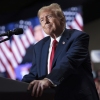
International newspapers reported that US President-elect Donald Trump won the elections in central Rome on Thursday.
Alessandra Tarantino/AP
Hide caption
Toggle caption
Alessandra Tarantino/AP
LONDON – Economists and investors expect a series of large-scale seismic impacts from… Donald Trump’s second presidential term. A range of financial markets have already seen significant volatility this week, from currencies to commodities to corporate share prices.
Here are some of the potential economic and financial impacts of what some economists and experts refer to as the “Trump Economy 2.0.”
Stock markets
The promise of lower taxes and looser corporate regulations could mean companies can boost their profits, and that possibility has been reflected since Tuesday in the stock prices of several major US companies. A company that has the potential for higher future profits attracts investors who buy its stock, which in turn causes the price of that stock to rise. This trend could continue for those in the banking, cryptocurrency, technology, defense and fossil fuel industries.

Goldman Sachs estimates that the largest US companies could see a 4% jump in their profits if corporate tax rates were reduced. But around the world, there may be corporate losers as well as winners, especially among companies that rely on imported products or materials, that sell to buyers abroad or that are located in the middle of global supply chains.
Emmanuel Cow of the British bank Barclays to caution That a large portion of profits from European companies Can be erased Next year, he explained in a research note, companies that make cars, beverages and chemicals could be hit the hardest because of their dependence on trade with the United States.
“These companies are suffering in terms of their share prices,” says analyst Stephen Woolcock. Expert in international trade Politics at the London School of Economics. “This is an extremely complex network of supply chains, and increased tariffs by the United States – which would likely trigger retaliatory actions by other major trading powers – would disrupt existing supply chains, leading to uncertainty, increased costs, “So it will have a big impact.” – To influence companies.
Companies that ultimately face higher costs due to tariffs could earn lower profits, which in turn could mean lower stock prices — unless they raise consumer prices. But higher prices can lead to higher inflation.
Trade, inflation and income
“For me, the most beautiful word in the dictionary is tariffs,” Trump said. He said in Chicago last month. Based on Trump’s previous tenure in the White House, as well as statements like this during his campaign, many economists say investors are already anticipating tariffs ranging from 10% on some countries’ products, and up to 60% to be applied to goods from China. . China.

“If tariffs are applied across the board, it will have impacts on consumers, and those impacts will be an increase in prices,” says Sébastien Jean, professor of economics at CNAM University in Paris and associate director at the French Institute of International Relations.
Economists at the nonpartisan Peterson Institute for International Economics in Washington, D.C., Estimated this summer Reinstating tax cuts that expired in 2017 that largely benefited wealthy Americans and imposing higher tariffs on imports — as Trump proposed during his campaign — could reduce after-tax income for poorer Americans by about 3.5% and would cost a typical family in mid-2017. 2017. Income Distribution About $1,700 in Increased Taxes Each Year.
The frequently stated goal behind Trump’s previous tariff plans was to boost domestic production. However, Trump’s tariffs on China did not bring much manufacturing to the United States – but rather moved it to other countries.
In fact, Federica Gereti, an economic security expert at the RAND Corporation, says that only consumers in China and the United States lost out during what is often called the “trade war” that boomed in 2018.
“The impact on the world has been relatively limited,” she says. “In some cases, in fact, there have been opportunities for third countries to go and occupy those areas of supply chains that were left empty or restricted by China or the United States.”
The one thing global financial markets don’t like is unpredictability, but that’s something you should expect now, says Jain. “A Trump presidency will usher in an era of increased uncertainty, and that is always a very bad thing for trade,” he says.
religion
This is thanks in part to tax cuts and emergency spending related to the Covid-19 pandemic, which the US government made during the last Trump administration. It saw its total debt riseIn addition to the widening of the fiscal deficit, which measures the difference between how much the US Treasury receives through taxes and other revenues, and how much it spends on government programs.
In the wake of Trump’s victory on Tuesday, the prospect of new “unfunded” spending — which would rely on borrowing more money from financial markets rather than raising taxes — has left investors wary of future US deficits and, by extension, its debt pile. Some estimates indicate that the additional deficit will exceed $7 trillion over the next decade.
When investors are concerned about the sustainability of a country’s debt, they are essentially demanding higher interest rates on the loans they make to that country’s government. Even before the election, concerns about the US public debt translated into higher yields on existing loans, an indicator of increasing borrowing costs for the US government.
“There appears to be a continuing desire to press ahead with the economic program without any regard to reining in debt spending – the ever-increasing debt share of the United States, which will get the United States into trouble at some point,” says the University of California. California, Berkeley, economist Ulrike Malmendier.
If inflation also appears likely to rise as a result of Trump’s actions once he takes office, it will simultaneously be difficult for the Fed to cut interest rates. This fact is also likely to encourage yields on government debt to remain high, increasing the cost of deficit reduction in the future.
Climate-related investing
The president-elect has repeatedly insisted that he will end regulatory restrictions on oil drilling, gas exploration and coal mining, and will work to limit additional expenses associated with President Biden’s inflation control law. Experts say the law not only boosted projects, companies and technologies designed to help tackle climate change, but also helped spur massive amounts of private capital to invest in “green technology,” including solar, wind, carbon capture and electric battery storage. .
Trump will try to preserve America’s role as the world’s largest oil producer by encouraging more domestic fossil fuel projects, with all the implications that would have on global carbon emissions, and analysts warn that this could end up hurting funds focused on… On sustainability, which has helped support a lot. On the energy transition and continued action to achieve previously agreed global climate goals.
“There will be less motivation to finance climate change tactics, and there will be a pushback,” Malmendinger says. “This is really bad news for the world, because the United States is a big part of the global economy, and not pushing it along with its other countries will make it very difficult to make progress.”




